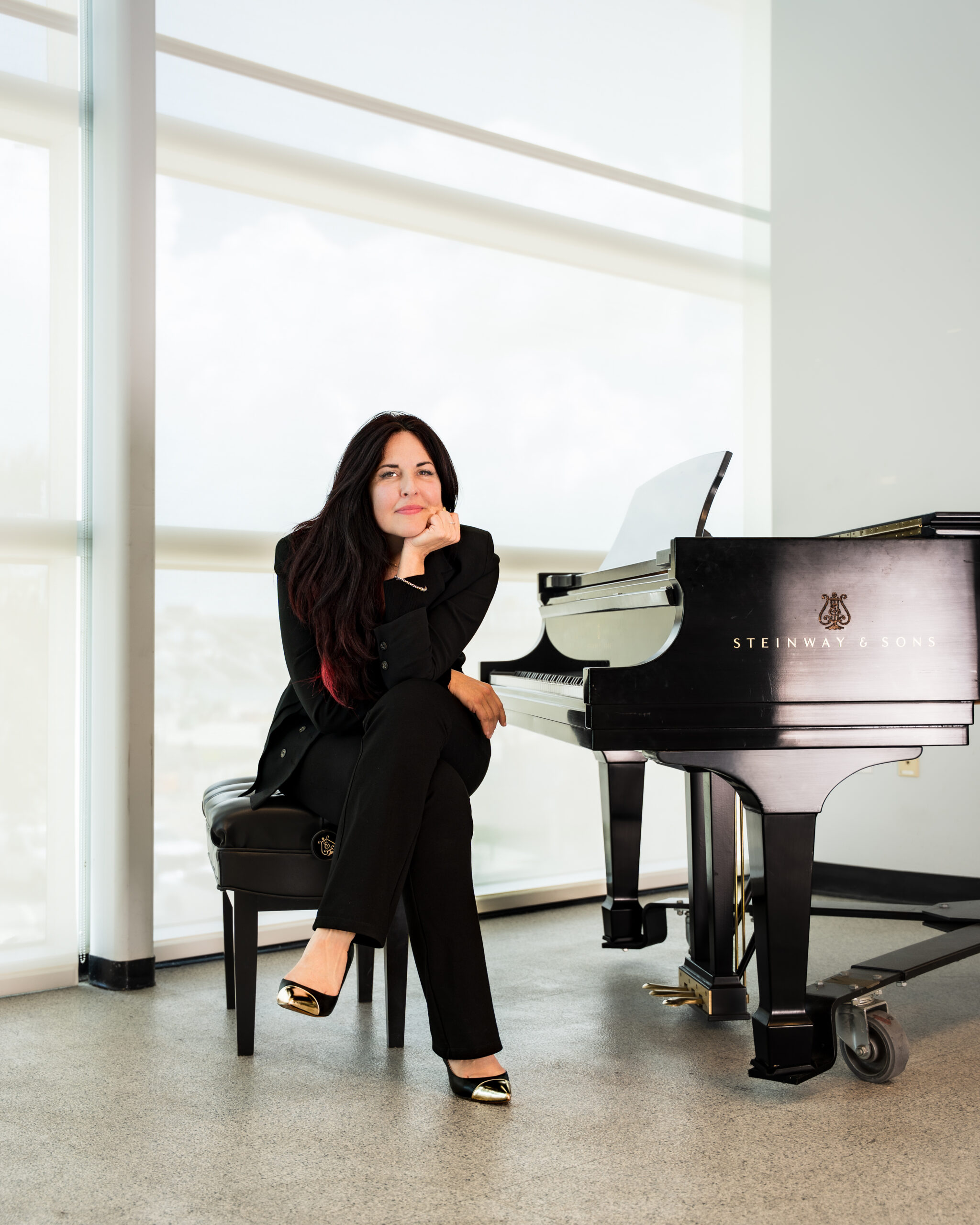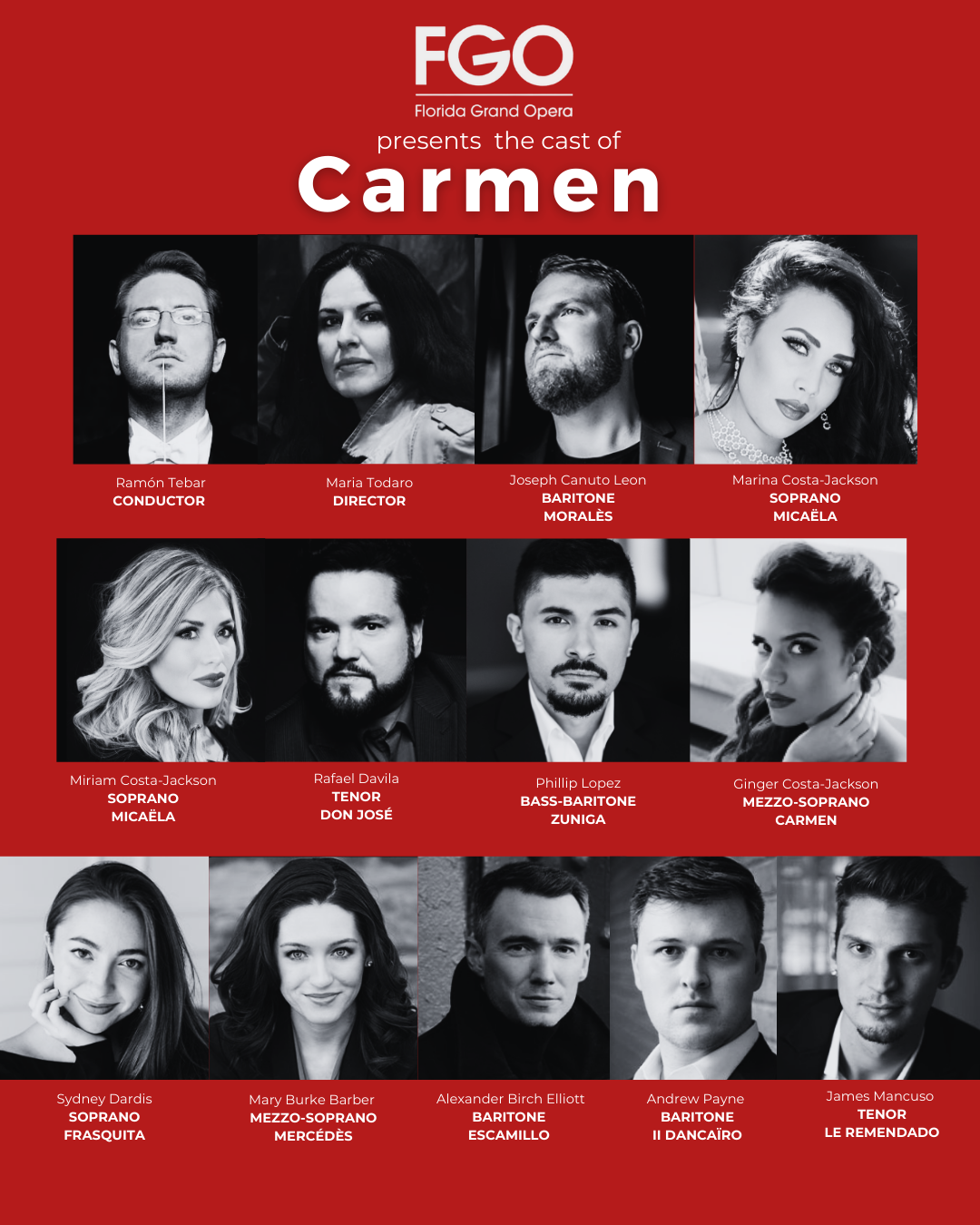
This April, Carmen returns to South Florida—not with the sultry flourish of a familiar femme fatale, but as a fierce freedom fighter in the heart of the Spanish Civil War. In a bold new interpretation by French-born director Maria Todaro, Florida Grand Opera’s production reframes Bizet’s iconic opera as a searing reflection on resilience, rebellion, and womanhood.
Presented at the Adrienne Arsht Center for the Performing Arts in Miami and the Broward Center for the Performing Arts in Fort Lauderdale, this Carmen draws its power from Todaro’s deeply personal and politically conscious vision.
A Personal Legacy Turned Political
For Todaro, this production is more than a directorial milestone—it’s an act of inheritance. Born to opera legends José Todaro and Maria-Helena de Oliveira, she was raised in the wings of the opera house, often backstage as her parents performed. Her mother, a celebrated Brazilian mezzo-soprano, performed Carmen over 250 times; her father frequently sang Don José. Their love story began during a production of Carmen—a legacy now passed down to their daughter.

“I was raised by stagehands,” Todaro laughs. “That was my babysitting. That was my upbringing.”
She herself once performed the title role before stepping behind the scenes, where she brings not only familial passion, but decades of experience in nearly every facet of opera production—from conducting and graphic design to grant writing and crew work. “There’s no job in an opera company I haven’t done,” she says. “So when I talk to my team, I talk as one of them.”
This intimate understanding of opera’s traditions allowed Todaro to break them—with purpose. Her decision to set the story in 1937, during the Spanish Civil War, transforms Carmen from a seductive personal drama into a broader political allegory. “The historical setting allows Carmen’s quest for freedom to resonate on a much broader level.”
Carmen as Freedom Fighter
“When Carmen talks about her freedom, it’s not just about her body,” she explains. “We are deepening the motivations of the characters by presenting them in this context—without changing a single word of the text.”
In this reimagining, Carmen becomes a strategist, a symbol of resistance, not just a figure of personal liberty. “Traditionally, Carmen is seen as selfish or manipulative,” Todaro says. “But when you view her through the lens of survival, especially in the chaos of war, her actions take on new meaning.”
The supporting characters also evolve with this context. Escamillo, the charismatic bullfighter, becomes a Schindler-like figure, using his public persona to aid the resistance. The smugglers of Act III are reinterpreted as underground operatives, smuggling weapons instead of contraband. The result is a narrative that honors Bizet’s score and Mérimée’s original text—while infusing it with fresh urgency and relevance.
“The Spanish Civil War gave us a landscape where Carmen’s defiance becomes political,” Todaro says. “It’s not just about seduction anymore. It’s about survival, about agency, about liberation.”
A Cast and Creative Team Like No Other
At the center of this production is powerhouse mezzo-soprano Ginger Costa-Jackson, lauded as “the Carmen of all Carmens.” Her commanding presence is matched by an extraordinary cast, including Rafael Davila as Don José, Alexander Birch Elliott as Escamillo, and, in a historic moment, all three Costa-Jackson sisters—Ginger, Marina, and Miriam—performing in the same opera, with Marina and Miriam alternating as Micaëla.

Todaro’s creative team was handpicked for their cinematic sensibilities. Camilla Haith’s costumes evoke the grit of wartime Spain, while Rosa Mercedes’s choreography infuses the performance with revolutionary energy. Lighting designer Robert Wierzel and the late scenic designer Allen Charles Klein complete a world that is both raw and romantic, urgent yet timeless.
Carmen in the 305
Asked what kind of woman Carmen might be today if she walked the streets of Miami, Todaro doesn’t hesitate. “She might be a journalist risking her life for the truth, or a young executive who refuses to be silenced,” she says. “She could be a DJ, a poet, or an artist—someone using her voice and body not to please, but to provoke, to lead, to liberate.”
Todaro compares Miami itself to Carmen—youthful, untamed, bursting with possibility. “Miami is like a teenager with dreams of becoming a grand lady,” she smiles. Miami is “vibrant, multicultural, and full of collaborators,” adding that “there’s no territorial attitude here. We’re building something new, together.”
That collaborative spirit has spilled into the city’s arts scene: Florida Grand Opera’s Carmen is paired with a companion performance from Miami City Ballet, and a joint video project featuring dancers from both companies was filmed at the Arsht Center, blending movement, music, and meaning into one powerful symbol of artistic unity.
A Vision for Opera’s Future
With Florida Grand Opera, Todaro sees a fertile ground for opera’s evolution. “Miami has the diversity, the wealth, and the entrepreneurial spirit to redefine how we support and experience opera,” she says. “We’re nurturing a new generation of philanthropists. She speaks passionately about the rise of a new philanthropic class—”the new Medicis”—tech-savvy entrepreneurs in South Florida who are poised to become the next great supporters of the arts. “They don’t even know they’re philanthropists yet,” she laughs. “But they are.”
With productions like this Carmen, Florida Grand Opera is writing a new chapter in its storied history—one that embraces inclusivity, challenges outdated narratives, and dares to redefine what opera can be.
For her, opera is not a relic but a living art form—capable of transformation, relevance, and revolution. “This is not rebellion,” she insists. “This is evolution. Opera must evolve with society, or it will fade. We’re using the art form to ask new questions, to hold up new mirrors.”
Final Curtain
In Todaro’s hands, Carmen is no longer just a tragic tale of love and jealousy. It becomes a call to consciousness, a rallying cry for freedom—personal, political, and artistic. With its historic cast, daring vision, and unwavering heart, this Carmen doesn’t just revisit an opera. It rewrites its purpose.
– S&P
PERFORMANCE DATES & TICKETS
Florida Grand Opera’s Carmen
Miami: Adrienne Arsht Center for the Performing Arts - April 12, 13, 15
Fort Lauderdale: Broward Center for the Performing Arts - April 24, 26


Leave a Reply